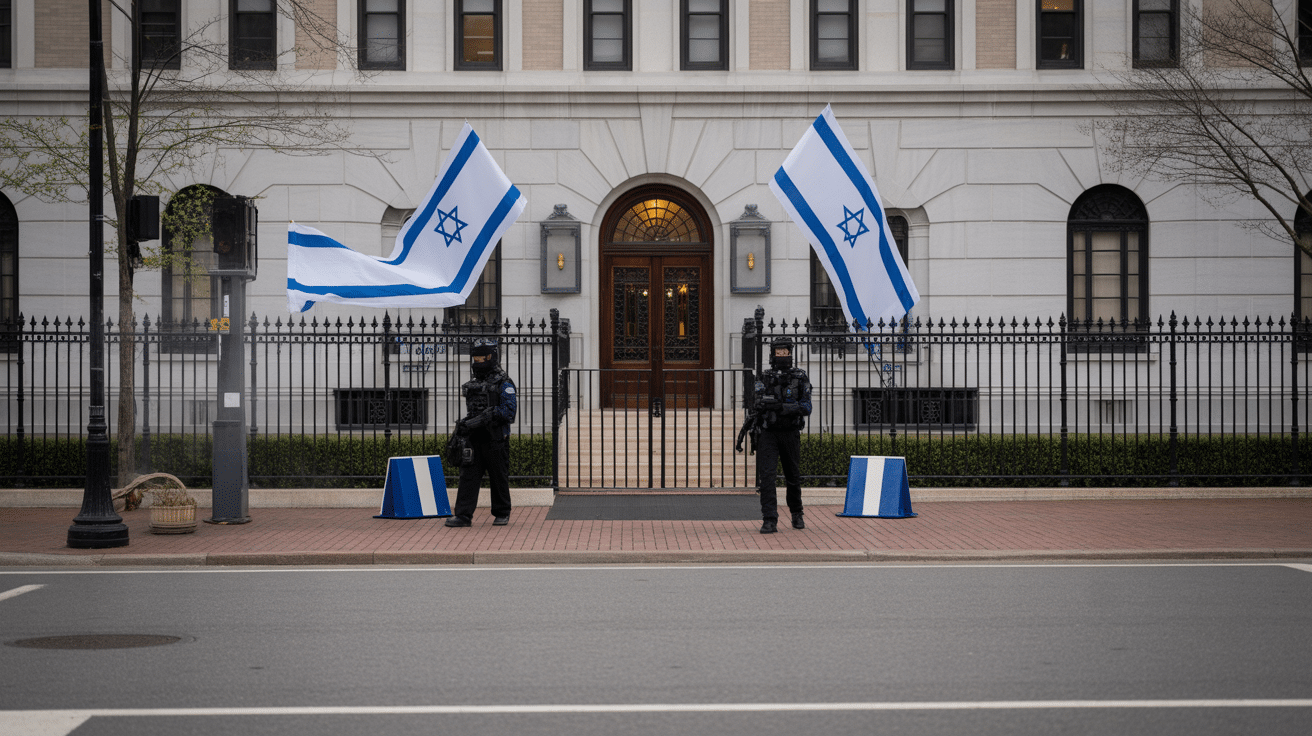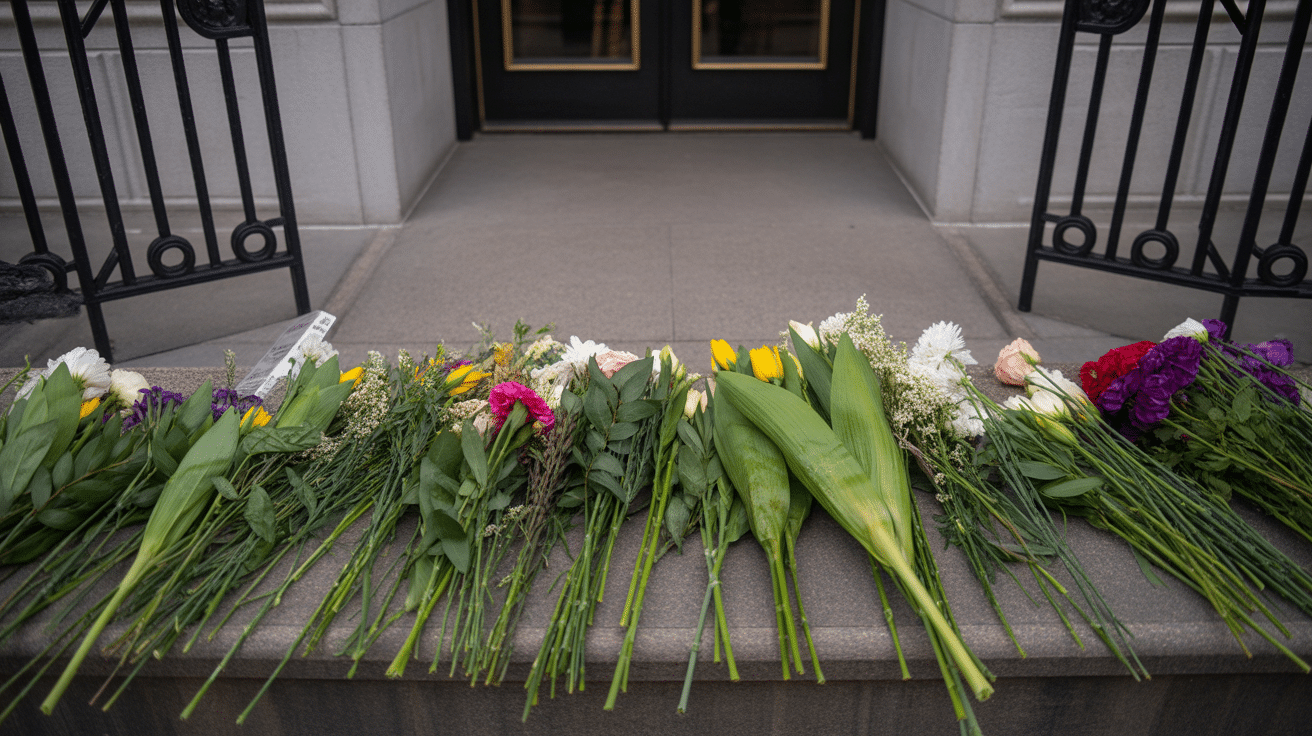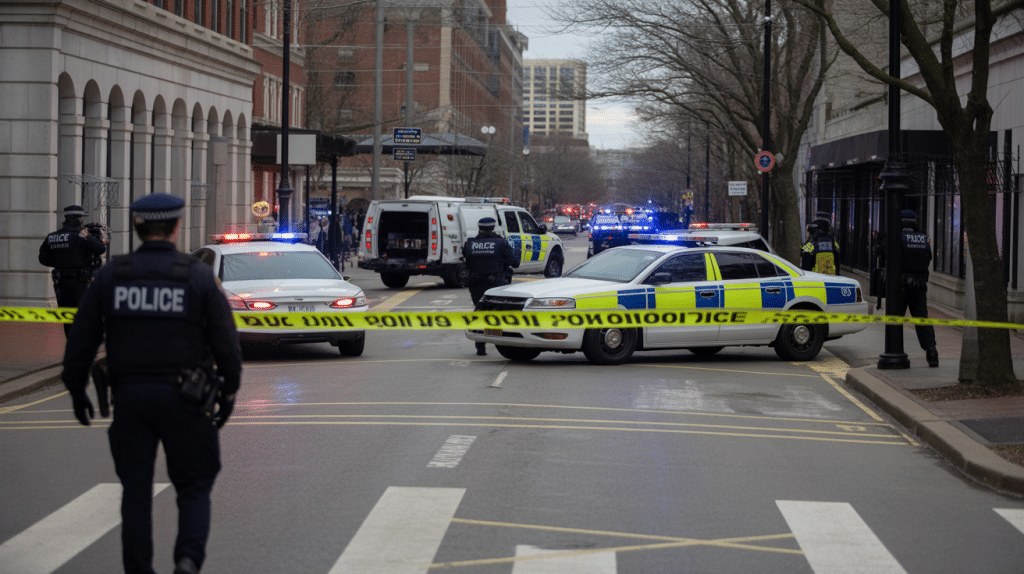Just moments ago, a deadly shooting near the Capital Jewish Museum in Washington, DC tragically claimed the lives of two Israeli embassy staff members. As you follow the unfolding events, you’ll learn about the suspect in custody, the motive linked to antisemitism, and how federal and local authorities are responding. This incident has deeply impacted the community, highlighting the ongoing threats faced by diplomatic staff. Stay informed with the latest updates to understand how this situation develops and what it means for your safety and awareness in the capital.
The Tragic Events: Timeline of the Shooting
Sequence of Events Leading to the Attack
Shortly after 9 p.m. on Wednesday night, following the conclusion of the American Jewish Committee’s “Young Diplomats Reception,” gunshots erupted near the Capital Jewish Museum in Washington, DC. The two victims—Israeli embassy staff members and a young couple on the verge of engagement—were leaving the event when the suspect, later identified as Elias Rodriguez, 30, from Chicago, opened fire without warning. After the shooting, Rodriguez fled the immediate scene and entered the museum itself, where he remained for over 10 minutes before police arrived.
During that interval, the suspect reportedly pretended to be a witness, interacting with bystanders and security personnel. When asked by security guards if he needed help, he muttered for someone to “call the police” repeatedly, yet gave no indication of being injured. Only upon law enforcement’s arrival did Rodriguez openly claim responsibility for the attack, yelling “Free Palestine” and stating that he “did it for Gaza,” confirming the targeted nature of this violent act.
Eyewitness Accounts and Initial Reactions
Eyewitnesses paint a disturbing picture of the moments following the shooting. Paige Siegel, who encountered the suspect inside the museum, described him as visibly shaken yet seemingly harmless at first. She recalled how he muttered about calling the police but appeared disoriented and fragile, which delayed any suspicion towards him. It wasn’t until law enforcement engagement that his true role emerged, as he was apprehended while vocally supporting Palestinian causes.
Sara Marinuzzi, another witness, observed Rodriguez’s erratic behavior immediately after the gunshots. Security personnel offered him water and attempted to calm him, assuming he had been a bystander. Her account confirms that the suspect’s declaration of responsibility came only after police had arrived, highlighting the calculated patience he demonstrated before openly admitting to the crime.
These firsthand perspectives emphasize how the suspect’s actions were deliberately deceptive, exploiting the initial shock of the scene. They also reveal the chilling proximity at which the attack occurred—the assailant sat among a group of Jews gathered inside the museum, underscoring a harrowing sense of vulnerability felt within the community amidst such targeted violence.
Identifying the Suspect: Background and Motives
Profile of Elias Rodriguez
Elias Rodriguez, 30, originally from Chicago, has quickly become the focal point of the investigation following the deadly shooting near the Capital Jewish Museum. Law enforcement sources describe him as an individual with no prior significant criminal record, but authorities are now delving into his online activity and social circles to better understand his recent radicalization. Witnesses recall Rodriguez’s behavior immediately after the shooting as erratic yet deliberate; he reportedly pretended to be a bystander for over ten minutes before openly admitting to his involvement and chanting “Free Palestine.” This chilling confession underlines a personal connection or deep commitment to the geopolitical conflict that appears to have motivated his actions.
Authorities are examining Rodriguez’s background for any links to extremist groups or prior indications of violent intentions. His sudden and targeted attack on two Israeli embassy staff members — described by officials as a “young couple about to be engaged” — suggests premeditation fueled by ideological conviction. In the days following the incident, Rodriguez’s interrogation by the FBI’s Joint Terrorism Task Forces aims to unravel the extent of his motivations, affiliations, and whether he acted alone or within a wider network.
The Ideological Underpinnings of the Attack
The suspect’s declaration of acting “for Gaza” and his repeated cries of “Free Palestine” at the scene point directly to a politically and ideologically charged motive rooted in the Israeli-Palestinian conflict. This rhetoric, combined with the choice of victims connected to the Israeli Embassy, marks the attack as an example of targeted violence driven by antisemitism and extremist political beliefs. Such incidents are often catalyzed by a mixture of global tensions, propaganda, and personal grievances that escalate into domestic acts of terrorism.
Evidence so far indicates Rodriguez viewed his act as a form of symbolic retaliation for the broader conflict in the Middle East, attempting to send a message through violence on American soil. This dynamic underscores the increasingly transnational nature of extremist ideology, where international disputes ignite acts of violence far from the original hotspots. Understanding these ideological drivers is important for you to grasp the complexity of motivations behind such attacks and the challenges faced by law enforcement in preventing them.

Official Responses: Statements and Condemnations
Presidential and Government Reactions
President Donald Trump promptly addressed the tragic incident, emphasizing that the shooting was “based obviously on antisemitism” and condemning such hatred as having no place in the United States. On Truth Social, he expressed his condolences to the victims’ families and called for an end to the violence, stressing that “Hatred and Radicalism have no place in the USA.” Attorney General Pam Bondi echoed these sentiments during a news conference, noting that she had spoken multiple times with Trump and that federal agencies would “work hand-in-hand” with local law enforcement to ensure the safety of all citizens, with particular concern for the Jewish community. You can expect continued coordination between the Department of Justice, FBI, and DC Metropolitan Police as the investigation unfolds.
Other senior officials joined in condemning the shooting, underscoring the targeted nature of the attack. Deputy FBI Director Dan Bongino highlighted that the shooting occurred near the FBI’s Washington Field Office, where FBI officers immediately responded and provided aid. He categorized the incident as an “act of targeted violence,” reinforcing the federal commitment to bring those responsible to justice. Public safety officials remain vigilant, and measures to protect embassies and Jewish establishments across the capital have likely been increased as a direct response to this attack.
Responses from Israeli Officials and Jewish Organizations
Israeli President Isaac Herzog offered a heartfelt statement, condemning the attack as a “despicable act of hatred, of antisemitism,” and expressing devastation over the loss of two young embassy employees. Herzog affirmed the strong bond between Israel and the United States, promising that both nations “will stand united in defense of our people and our shared values.” Israeli Foreign Minister Gideon Sa’ar reaffirmed Israel’s resolve, stating firmly that the country “will not surrender to terrorism,” and conveyed that an intensive investigation was underway, following his conversation with the US Ambassador to Israel. These statements serve as a powerful reminder of the international implications of the attack and the solidarity between the two nations.
On the local front, Ron Halber, CEO of the Jewish Community Relations Council of Greater Washington, emphasized the resilience of the Jewish people and called for living proud, open lives while maintaining necessary security precautions. The fact that the attack happened as young Jewish professionals were gathering for an event designed to promote unity and dialogue further underscored the chilling intent behind the violence. Eyewitness accounts from those at the Capital Jewish Museum described a scene marked by shock and sorrow, but also determination not to let fear dictate the community’s future.
The outpouring of support from both Israeli officials and American Jewish organizations reflects the shared determination to confront antisemitism and violence head-on while honoring the memory of those lost. You can anticipate ongoing advocacy for increased security and renewed efforts in fostering interfaith and diplomatic dialogue in the wake of this tragedy.
Community Impact: Resilience in the Face of Violence
The tragic loss of a young couple, both staff members of the Israeli Embassy, struck deeply within the Washington, DC Jewish community, especially as the attack unfolded near the Capital Jewish Museum during a night meant to foster connection and hope. You can feel the weight of grief, but also a powerful undercurrent of determination not to let this violence define the community’s spirit. Ron Halber, CEO of the Jewish Community Relations Council of Greater Washington, captured this sentiment, emphasizing that the Jewish people and the State of Israel have repeatedly shown remarkable resilience in the face of hatred. His call to live openly and proudly, while simultaneously taking needed security precautions, resonates as both a balm and a roadmap for moving forward through adversity.
As you engage with the community’s response, it’s clear that this act of targeted antisemitic violence was met not with fear alone, but with a renewed sense of solidarity. Israeli President Isaac Herzog’s statements underline the transatlantic bond of support and commitment to shared values in combating hate. The fact that the incident occurred on the same evening as the Young Diplomats Reception — a gathering of young Jewish professionals and diplomats aiming to build bridges despite geopolitical differences—adds a poignant layer to the community’s resolve. The shooting, meant to sow discord, instead illuminated the continuity of hope and shared purpose that refuses to be extinguished.
Reactions from the Jewish Community in DC
You would witness a community grappling with shock while simultaneously reinforcing its support networks. Eyewitnesses like Paige Siegel expressed disbelief at the calm before police apprehended the suspect, highlighting how quickly an environment of safety was shattered. More so, her reflection on being “lumped in one room” targeted by terrorism speaks to the vulnerability many feel, yet also their collective strength in standing firm. Local Jewish leaders have echoed this, emphasizing that fear mustn’t dictate daily life. This sentiment shapes many community dialogues now, centering on resilience, remembrance, and proactive engagement to protect one another.
Community reactions have also been amplified by public officials and organizations who condemned the attack unequivocally. Attorney General Pam Bondi’s pledge for federal and local agencies to work “hand-in-hand” reassures you that response efforts are comprehensive and robust. The connectedness of the Jewish community in DC, coupled with its broader network across the US and Israel, underscores a shared commitment not only to mourn but to act. Maintaining open communication across embassies and community groups has become a vital part of healing and preparedness in the aftermath.
Strategies for Combating Fear and Promoting Safety
In the wake of this violence, concrete steps toward enhancing community safety have gained urgency. You’ll observe intensified collaboration between the Jewish Community Relations Council and local law enforcement agencies to increase visible security measures, especially around cultural and religious sites. These efforts include heightened police presence, installation of additional surveillance, and coordinated emergency response training. The overarching goal is to create environments where you can participate openly in cultural events without compromising your safety. Security briefing programs and awareness campaigns have also been expanded to educate community members on recognizing and reporting potential threats.
Beyond physical security, emotional resilience and communal solidarity have become key to combating the pervasive fear that such attacks aim to instill. Initiatives led by organizations such as IsraAID and the Multifaith Alliance focus on humanitarian diplomacy and building inclusive support networks that reach beyond the Jewish community. By fostering interfaith connection and dialogue, these programs seek to counteract polarization and strengthen societal cohesion. The impact of these strategies is evident in the steadfast presence of young professionals at events like the Young Diplomats Reception, which symbolizes hope and a collective refusal to yield to hatred.
Supporting you in navigating the complex aftermath of this shooting involves a combination of immediate security enhancements and sustained community engagement that prioritizes openness without sacrificing vigilance. Regular security assessments inform adjustments in resource allocation, while empowerment through education ensures you and others remain alert without succumbing to intimidation. This balance of protection and perseverance helps maintain the vibrancy and safety of the DC Jewish community in uncertain times.
Investigative Developments: Law Enforcement’s Approach
The investigation into the shooting near the Capital Jewish Museum is being led jointly by the Washington, DC Metropolitan Police and the FBI’s Joint Terrorism Task Forces, reflecting the serious nature of the incident as targeted violence. Authorities swiftly apprehended Elias Rodriguez, who was found at the scene shortly after the attack, and he is currently undergoing intensive questioning to determine the full scope of his motives and any potential accomplices. During the initial interviews, Rodriguez openly claimed responsibility, shouting slogans that link the attack to political grievances tied to Gaza, which law enforcement is now thoroughly examining to assess whether this was a lone act or connected to broader networks.

Ongoing Investigations and Legal Procedures
Beyond the immediate interrogation of the suspect, investigators are conducting extensive background checks into Elias Rodriguez’s history, digital footprint, and possible communications with extremist groups. The goal here is to identify any affiliations that could indicate premeditation or coordination, especially given the suspect’s explicit expression of political motives. Meanwhile, prosecutors are preparing a strong federal case, facilitated by the presence of US Attorney Jeanine Pirro and her team on site, to ensure that charges including hate crimes, terrorism, and murder are pursued comprehensively.
You should anticipate that evidence such as ballistic reports and digital device forensics will be crucial in supporting a prosecution strategy that relies on linking intent with action. The investigative teams are also engaging with embassy security personnel and local community leaders to build a narrative around the victims’ roles and the impact of the crime, which will further frame the legal response. Given the shooter’s behavior of pretending to be a witness, authorities are sifting through claims and witness accounts for inconsistencies, aiming to create a precise, accountable record of the event.
Implications for National Security and Policy Changes
This attack is already prompting intense discussion within security circles about the vulnerability of diplomatic staff and sensitive cultural sites in the nation’s capital. You will see policymakers evaluating current protective measures for embassy personnel and venues that serve as community hubs, particularly those symbolizing minority and international interests. The proximity of the shooting to an event promoting interfaith dialogue during a time of regional turmoil underscores the need to bolster intelligence-sharing mechanisms and community engagement strategies designed to preempt organized or lone-actor assaults motivated by politically charged hatred.
Federal officials, including Attorney General Pam Bondi, have emphasized the commitment to bolstering safeguards by coordinating between local, state, and federal agencies, potentially leading to updated protocols for threat detection and response. There is growing recognition that incidents like this necessitate not only tactical changes in security deployment but also broader policy shifts that address the root causes of extremism and antisemitism within the United States, integrating prevention with community resilience efforts.
With rising concerns about domestic terrorism and hate crimes, especially those with international geopolitical connections, your understanding of national security strategy must account for the fact that Washington, DC’s status as both a political epicenter and a diverse community space places it at elevated risk. This shooting acts as a stark catalyst for reviewing counterterrorism priorities, including enhanced funding for cultural site security, improved emergency response training, and the expansion of community policing models that emphasize trust-building in vulnerable populations.
To wrap up
Drawing together the events of the Washington, DC shooting near the Capital Jewish Museum, you can see how this tragic incident deeply affects not only the local community but also resonates internationally. Two young Israeli embassy staff members, described as a couple about to be engaged, were senselessly targeted in an act fueled by antisemitism and hatred. The suspect’s actions and declarations linked to ongoing geopolitical tensions highlight the complexities that can intersect with acts of violence on your own soil. In response, law enforcement agencies and government officials are actively collaborating to ensure safety and justice, demonstrating the seriousness with which your authorities are addressing the situation.
As you process this unsettling news, it is apparent that both community leaders and officials emphasize resilience and solidarity in the face of such attacks. The incident serves as a somber reminder of the threats that can arise in diverse societies, and your engagement with accurate information helps support an informed public response. Moving forward, maintaining awareness of developments and supporting efforts to foster security and unity will be part of how you contribute to a safer environment for all.

